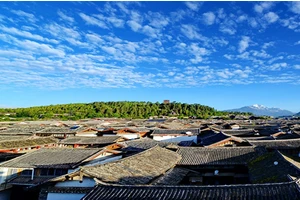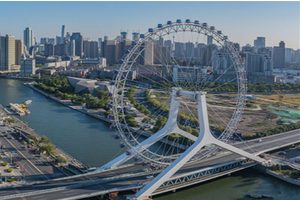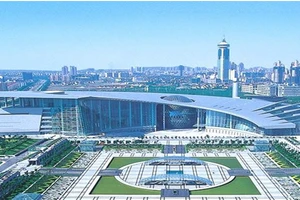Fengxian county travel agency
Fengxian County, a county under the jurisdiction of Xuzhou City, is located in the northwest of Xuzhou City, Jiangsu Province. It is connected with tongshan district and Peixian County in the east, Jinxiang County and Yutai County in the north, Dangshan County and Xiaoxian County in the south and Shanxian County in the west. Located in the center of Huaihai Economic Zone and the southeast edge of North China Plain. Xuji Expressway runs through the whole territory, connecting Beijing-Fuzhou Line, Beijing-Shanghai Line and Lianhuo Line. Fuxin River in the territory leads to Weishan Lake and is connected with the Beijing-Hangzhou Canal.
Fengxian county covers an area of 1450.2 square kilometers. By the end of 2020, the resident population of Fengxian County was 935,200. In 2021, Fengxian is expected to complete the regional GDP of 55 billion yuan, the general public budget revenue of 3.302 billion yuan, and the total retail sales of social consumer goods of 32 billion yuan.
Fengxian county belongs to Xuzhou city, Jiangsu province, and was called Fengcheng in ancient times. According to legend, a phoenix once landed here in ancient times. Fengxian county is located at the junction of four provinces and seven counties in Jiangsu, Shandong, Henan and Anhui, and in the center of Huaihai Economic Zone. The county covers a total area of 1,449.7 square kilometers, with a length of 59.2 kilometers from north to south and a width of 46.6 kilometers from east to west. It has jurisdiction over 14 towns and 1 forest farm with a population of 1.1 million. Fengxian has jurisdiction over 14 towns, including Fengcheng Town, Shouxian Town, Shunhe Town, Changdian Town, Huankou Town, Shizhai Town, Huashan Town, Liangzhai Town, Fanlou Town, Sunlou Town, Songlou Town, Dashahe Town, Wanggou Town and Zhaozhuang Town.
Fengxian County was called Fengyi, Qintai and Fengcheng in ancient times. According to legend, it was named after the phoenix landed here in ancient times. Fengxian has a long history, and there is a saying that "Xuzhou comes first, then Xuan, and only Fengxian does not remember the year". It is the hometown of Emperor Gaozu Liu Bang and Tianshi Zhang Daoling, with "the land of the eternal dragonfly and the hometown of a generation of emperors"; The reputation of the hometown of Tianshi. It is a national pilot county with strong intellectual property rights, an advanced county in digital agriculture and rural development, a national pilot county in digital villages, a top 100 county in small and medium-sized cities with the most investment potential and a county with the most investment and business value in China.
Tourist attractions in Fengxian county
Centennial Pear Garden, Centennial Pear Tree King in Fengxian County, Fengxian County, Emu Gu, Gaocheng, Yanwangcheng, Miaocheng, Jing Ke Tomb, Zhongyangli, Jinliuzhai, Magong Academy, Bayushe, Sanli Temple (35-Li Temple), Food City, Invited Emperor City, Xiao He House and Jianghou Tomb. Chenghuang Temple, Sanxinglin, Taolou, Confucian Temple, Daguanlou, Guanyue Temple, Four Doors to Eight Temples, Wu's Archway, Stop Monument, Shuikeng Ya, Huaijitang Pharmacy, Fengming Tower, Leyu Academy, Li Wei Tomb, Mosque, Shili Temple, Catholic Church, Christian Church, Fengming Park in Fengxian County, Martyrs Cemetery, Champion Monument Garden, etc.
Fengxian is a county-level city under the jurisdiction of Zhoukou City, Henan Province, and Qujia is an ancient local folk custom. Canal home refers to a kind of folk project mainly for water diversion, which is organized by villagers spontaneously and built by self-financing and self-construction, in order to solve the local irrigation and water supply problems. The inheritance and development of Qujia not only reflects the spontaneous organizational ability and pragmatic spirit of the local people, but also reflects the excellent traditional culture and etiquette beauty of the Chinese nation.
Qujia has a long history in Fengxian County, and its history can be traced back to the Han Dynasty. In ancient times, it was very common for local people to dig canals by themselves. With the passage of time, the tradition of canal family gradually formed. In Qing dynasty, the government began to pay attention to the construction of Qujia project because it could increase the local grain output. Up to now, there are many canals with a history of 100 years in Fengxian county, which have become important historical and cultural heritage and tourism resources in the local area.
In recent years, with the development of urbanization and the modernization of agriculture, the tradition of canal families has been impacted to a certain extent, and many canal families have lost their original uses. In this case, in order to protect and inherit the Qujia culture in Fengxian, the local government and social organizations have actively carried out various publicity and activities to improve public awareness and participation. In the future, Fengxian hopes to strengthen the publicity and protection of Qujia culture, develop it into a characteristic brand and cultural symbol of Fengxian, and promote the development of local cultural tourism.






